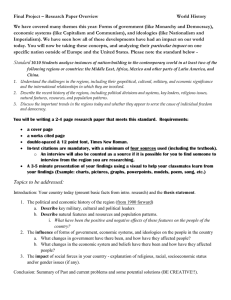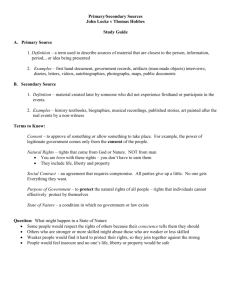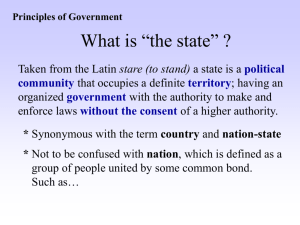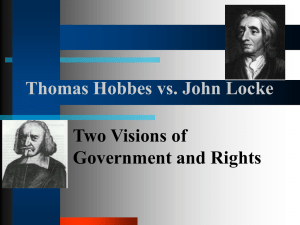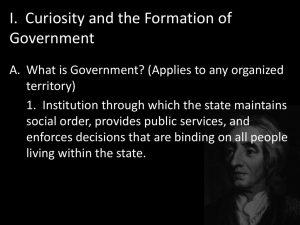Textbook: American Government: Roots and Reform: Karen O
advertisement
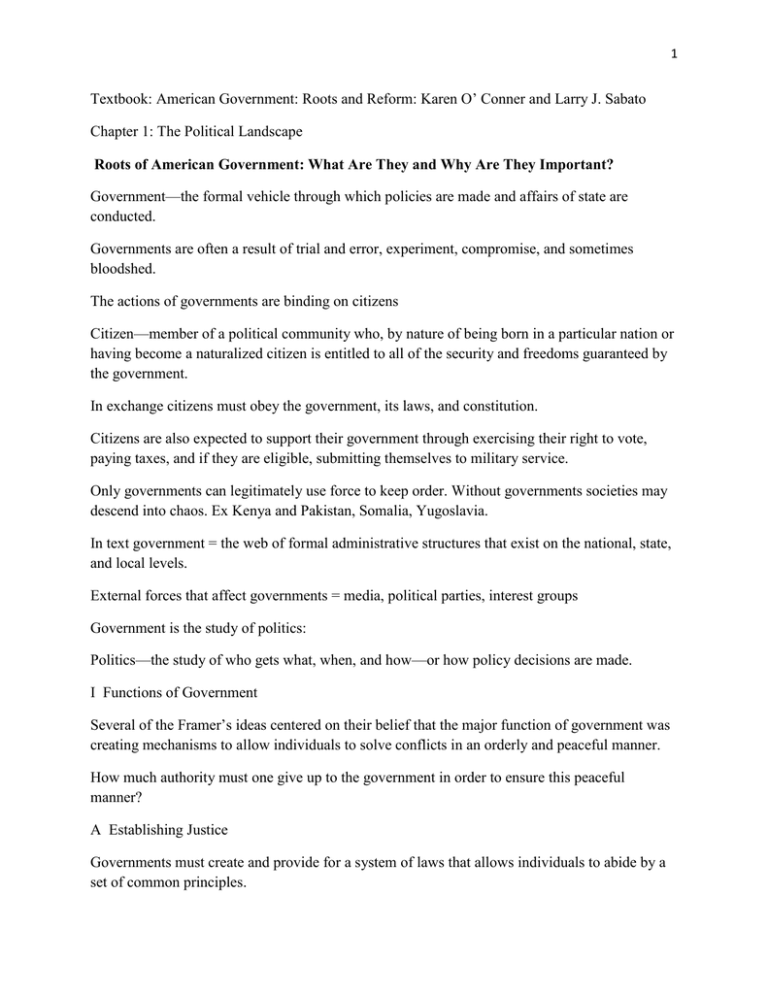
1 Textbook: American Government: Roots and Reform: Karen O’ Conner and Larry J. Sabato Chapter 1: The Political Landscape Roots of American Government: What Are They and Why Are They Important? Government—the formal vehicle through which policies are made and affairs of state are conducted. Governments are often a result of trial and error, experiment, compromise, and sometimes bloodshed. The actions of governments are binding on citizens Citizen—member of a political community who, by nature of being born in a particular nation or having become a naturalized citizen is entitled to all of the security and freedoms guaranteed by the government. In exchange citizens must obey the government, its laws, and constitution. Citizens are also expected to support their government through exercising their right to vote, paying taxes, and if they are eligible, submitting themselves to military service. Only governments can legitimately use force to keep order. Without governments societies may descend into chaos. Ex Kenya and Pakistan, Somalia, Yugoslavia. In text government = the web of formal administrative structures that exist on the national, state, and local levels. External forces that affect governments = media, political parties, interest groups Government is the study of politics: Politics—the study of who gets what, when, and how—or how policy decisions are made. I Functions of Government Several of the Framer’s ideas centered on their belief that the major function of government was creating mechanisms to allow individuals to solve conflicts in an orderly and peaceful manner. How much authority must one give up to the government in order to ensure this peaceful manner? A Establishing Justice Governments must create and provide for a system of laws that allows individuals to abide by a set of common principles. 2 EX. Bill of Rights est. trial by jury, informed of charges against them, and tried in a courtroom by an impartial judge. B Insuring Domestic Tranquility Ex the enormous effort the government took to prevent anymore terrorist attacks after 9/11/2001. Local governments have police forces, the states have the national guards, and the federal government can always call up troops to quell any threats. C Providing for the Common Defense The President is the Commander and Chief of the armed forces and the Congress is given the authority to raise an army. One of the major purposes of government was to provide for the safety of its citizens. D Promoting the General Welfare EX. Social security and governmental programs providing health care. There is no way that the framers could have envisioned the scope government would have take to provide for the general welfare. E Secure the Blessings of Liberty A well functioning government that enjoys the support of its citizenry is one of the best ways to ensure the blessings of liberty. List some freedoms that citizens enjoy. Criticize the government petition, the government, flag as a unifying force. II Types of Government Plato and Aristotle tried to categorize government by who participates, who governs, and how much authority those who govern enjoy. Government rejected by the framers: monarchy and aristocracy Monarchy—a form of government in which power is vested in hereditary kings and queens who govern in the interests of all. Aristocracy—a government by the few in the service of the many. Totalitarianism—“rule by tyranny” a form of government in which power resides in a leader who rules according to self-interest and with regard for individual rights and liberties. Leaders exercise unlimited powers and individuals have no personal rights or liberties. Generally, these 3 systems tend to be ruled by a particular religion or orthodoxy, an ideology, or a personal cult organized around a supreme leader. Saddam Hussein; Iraq, Stalin; USSR, Hitler; Germany, Mussolini; Italy Oligarchy—a form of government in which the right to participate is conditioned on the possession of wealth, social status, military position, or achievement. Rule by In Whose Interest? Public Self One monarchy Tyranny The Few aristocracy oligarchy The many polity democracy Democracy—a system of government that gives power to the people, whether directly or through elected individuals. The Philosophical Origins of American Government III The Reformation and the Enlightenment: Questioning the Divine Right of Kings Four theories of government: Force, Evolutionary, Divine Right, Social Contract During the Enlightenment, Isaac Newton and others argued that the world could be improved through the use of human reason, science, and religious toleration. They challenged other theorists that fate alone controlled an individuals destiny and that kings ruled by Divine Right. The intellectual and religious developments of the Enlightenment and the Reformation during the 16th and 17th centuries encouraged people to seek alternatives to absolute monarchies and to ponder new methods of governance. The Pilgrims were the first group of Protestants to leave England (under religious persecution) and set up self-governing bodies in their congregation in the United States. The Mayflower Compact set up the new form of government was written while the pilgrims were still at sea. It took the form of a social contract. Be sure to discuss: The Petition of Right, The English Bill of Rights, Magna Carta, also. Mayflower Compact—Document written by the Pilgrims while at sea enumerating the scope of their government and its expectations of citizens 4 Social Contract—an agreement b/w the people and their government signifying their consent to be governed. IV Hobbes, Locke, and the Social Contract Theory of Government Social Contract Theory—The belief that people are free and equal by natural right, and that this in turn requires that all people give their consent to be governed; espoused by John Locke and influential in the writing of the Declaration of Independence A Hobbes Hobbes was highly influenced by the events of the English Civil War during the mid 17th Century. His most famous work is the Leviathan (a biblical sea creature was his characterization of government) Leviathan (1651) is a book on politics that deals with religion and moral philosophy. In it Hobbes argues that the natural state of mankind was one of war. The best form of government to Hobbes was a monarchy to prevent the state of nature. In the state of nature people would live like animals and life would be nasty, brutish and short b/c there were no written rules. Life would be a constant struggle to survive against the evil of others. For these reasons according to Hobbes government had to intrude on people’s rights and liberties to better control society and to provide the necessary safeguards for property. Hobbes argued for a single ruler, no matter how evil, to guarantee the rights of the weak against the strong. Leviathan is his characterization of an all powerful government. Strict adherence to Leviathan’s laws, however all encompassing or intrusive on liberty was a small price to pay for a civilized society. B John Locke Locke takes the basic survival of humanity for granted. Locke argued that the major responsibility of government was the preservation of private property. Locke wrote—Second Treatise on Civil Government (1689) and Essay Concerning Human Understanding (1690) 5 In his works Locke denies the Divine Right of Kings to govern and argues that individuals were born equal and with natural rights that no king had the power to void. According to Locke’s social contract theory the consent of the people is the only true basis of any sovereign’s right to rule. People form governments largely to preserve life, liberty, and property, and to ensure justice. If governments act improperly then they break the social contract and no longer obtain the consent of the governed. Locke believed the true justice comes from the law. Locke argued that the branch of government that makes the laws not the one that enforce the laws should be the most powerful. Locke is the main influence in Thomas Jefferson’s writing of the Declaration of Independence. V Devising a National Government in the Colonies The New England town meeting where all citizens gather to discuss and decide issues facing the town, today stands as a surviving example of a direct democracy Direct democracy—a system of government in which members of the polity meet to discuss all policy decisions and then agree to abide by majority rule. This system was used in ancient Greece. Representative Democracy (Indirect Democracy)—a system of government that gives citizens the opportunity to vote for representatives who will work on their behalf. The Virginia House of Burgesses (1619) was the first representative assembly in North America. Rousseau and the Ancient Greeks believed that indirect democracy was undemocratic because not all citizens had a direct say in government. Discuss this in class.. Republic—a government rooted in the consent of the governed; a representative or indirect democracy. American Political Culture and the Basic Tenets of American Democracy Political culture—Commonly shared attitudes, beliefs, and core values about how government should operate. American political culture emphasizes the values of liberty, equality, popular consent, majority rule, popular sovereignty, civil society, individualism and religious faith. 6 VI Personal Liberty Personal Liberty—A key characteristic of the U.S. democracy. Initially meaning freedom from governmental interference, today it includes demands for freedom to engage in a variety of practices without governmental interference or discrimination. Over the years our concepts has changed from “freedom from” to “freedom to” The framers intended Americans to be free from governmental infringements on freedom of religion and speech, from unreasonable search and seizure. The addition of the 14th Amendment and its emphasis on due process and on equal protection of the laws as well as the subsequent passage of laws guaranteeing civil rights however expanded American’s concepts of liberty to include demands for freedom to work or go to school without discrimination. VII Equality Political Equality—the belief that all citizens are equal in the political process, as implied by the phrase “one person, one vote” Political equality is a dream far short of reality. Discuss with the class. VIII Popular Consent, Majority rule, and Popular Sovereignty Popular consent—the principle that governments must draw their powers from the consent of the governed. Majority rule—the central premise of direct democracy in which only policies that collectively garner the support of a majority of voters will be made into law. Majority rule but Minority rights. Civil Rights Act of 1964 and the Voting Rights Act of 1965 both designed to further minority rights. Popular Sovereignty—the notion that the ultimate authority in society rests with the people. Natural Law—a doctrine that society should be governed by certain ethical principles that are part of nature and as such can be understood by reason. IX Civil Society Civil Society—Society created when citizens are allowed to organize and express their views publicly as they engage in an open debate about public policy X Individualism 7 The ability of government to allow each person to achieve his or her highest level of development is the key focus in the US democracy as opposed to Canada where the group is considered higher. Discuss Universal Health Care, NCLB, etc… XI Religious Faith and Religious Freedom Since the creation of the US and due to the fact the a major reason for leaving England was religious persecution religious freedom and faith have been major tenants of the idea of American Democracy Political Ideology: Its Role in the World and in American Politics Political Ideology—the coherent set of values and beliefs about the purpose and scope of government held by groups and individuals. Ideologies are sets or systems of beliefs that shape the thinking of individuals and how they view the world, especially in regard to issues of “race, nationality, the role and function of government, the relations between men and women, human responsibility for the natural environment, and many other matters. Four functions attributed to Ideologies: 1. Explanation. Ideologies can provide us with reasons for why social and political conditions are the way they are, especially in times of crisis. 2. Evaluation. Ideologies can provide for standards for evaluating social conditions and political institutions and events. 3. Orientation. Ideologies can provide a sense of identity, whether you are male, female, native born or foreign born. Much like a compass, ideologies provide individuals with an orientation toward issues and a position within the world. 4. Political Program. Ideologies help people to make political choices and guide their political actions. Ex republican party pro-life. XII Prevailing American Political Ideologies Important to remember that conservatives may be liberal on some issues and vice versa. Libertarian—one who favors a free market economy and no governmental interference in personal liberties. Most common views below: Conservative—one who believes that government is best that governs least and that big government can only infringe on individual, personal, and economic rights. 8 Social conservative—one who believes that traditional moral teachings should be supported and furthered by the government Liberal—one who favors governmental involvement in the economy and in the provision of social services and who takes an activist role in protecting the rights of women, the elderly, minorities, and the environment. XIII Problems with Political Labels Today, most Americans’ positions on specific issues cut across liberal/ conservative ideological boundaries, and most people prefer to be categorized as moderates. Changing Characteristics of the American People XIV Changing Size and Population Today there are over 304 million Americans and due to its large size many Americans feel greatly removed from government. Members of Congress feel this change too. XV Changing Demographics of the US Population As the physical size and population of the United States have changed so have many of the assumptions on which it was founded. A Changes in Racial and Ethnic Composition Today more than 40 million people are considered immigrants in the United States and they are assimilating into American culture more quickly than ever before. The racial and ethnic balance in America has changed dramatically with the proportion of Hispanics growing at the quickest rate and taking over as the second most common racial or ethnic group in the US 40 percent of American under the age of 25 are members of a minority group. This will have a significant impact on the future of America’s voting demographic. B Changes in Age Cohort Composition Today the US is an aging population. This greatly changes the demands on the government An aging America poses a great financial burden on working Americans whose proportion of the population is rapidly declining. Examples voting for schools, medicare and social security reform. 9 C Changes in Family and Family Size Family size and household arrangements can be affected by several factors, including age at first marriage, divorce rates, economic conditions, longevity rates, and improvements in health care. In the past large families were important b/c children were a source for cheap labor. Industrialization and knowledge of birth control changed that. Today 25% of children live in a single parent household. These changes in composition of households, lower birthrates, and prevalence of single-parent families affect the kinds of demands people place on government as well as their perceptions of the role that government should play in their lives. XVI Attitudinal Change and Reform American Dream—an American ideal of a happy successful life, which often includes wealth, a house, a better life for one’s children and for some the ability to grow up to be president. These views are greatly affected by the ever growing sources of media from the major networks the cable news shows and now the internet. XVII High Expectations Reform becomes difficult when expectation are increasingly high Economist Charles Lindbloom argues that most political change is incremental XVIII Redefining Our Expectations Concerning Reform Review: What are the roots of American Government? Governments which are made up of individuals and institutions, are the vehicles through which policies are made and affairs of state are conducted. We need governments to maintain order because governments alone can use force legitimately. Governments have many functions. In the US context, most of these are included in the Preamble to the Constitution. Governments take many forms depending on the number who rule as well as whose interests are represented. What are the philosophical origins of American government? The American political system is based on several principles that have their roots in classical Greek ideas about democracy. These ideas of social contract theorists John Locke and Thomas Hobbes, who held the belief that people are free and equal by natural right, have continuing implications for our ideas of the proper role of government in our direct democracy. 10 What defines American political culture and what are the tenets of American Democracy? Key tenets of Americans’ shared political culture are personal liberty, equality, popular consent and majority rule, popular sovereignty, civil society, individualism, and religious faith. What is the role of political ideology in the United States and the world? Ideologies, the belief systems that shape the thinking of individuals and how they view the world, play a powerful role in politics here and abroad. Most Americans identify themselves as conservatives, liberals, or moderates. What are the changing characteristics of the American people? Several characteristics of the American electorate can help us understand how the system continues to evolve and change. Chief among these are changes in size, population, and demographics. How do population changes and Americans attitudes toward government affect policies and efforts towards reform? Shifts in population have created controversy in the American electorate throughout America’s history. Membership in a demographic group is likely to affect one’s outlook on government policies. Moreover, Americans have high and often unrealistic expectations of government yet often fail to appreciate how much their government actually does for them. Americans’ failing trust in institutions also explains some of the apathy evidenced in the electorate. Key Terms: American Dream, citizen, civil society, conservative, democracy, direct democracy, government, Indirct (representative) democracy, liberal, libertarian, majority rule, Mayflower Compact, monarchy, natural law, oligarchy, personal liberty, political culture, political equality, political ideology, politics, popular consent, popular sovereignty, republic, social conservative, social contract, social contract theory, totalitarianism Identify: Magna Carta, English Bill of Rights, Petition of Right, Force Theory, Evolutionary Theory, Divine Right Theory, Social Contract Theory, John Locke, Thomas Hobbes, Enlightenment, Reformation, Puritans, Virginia House of Burgesses. Jean-Jacque Rousseau, Sir Isaac Newton, four functions of ideologies.
